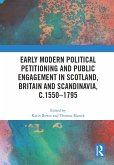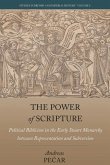The 'humble petition' was ubiquitous in early modern society and featured prominently in crucial moments such as the outbreak of the civil wars and in everyday local negotiations about taxation, welfare and litigation. People at all levels of society - from noblemen to paupers - used petitions to make their voices heard and these are valuable sources for mapping the structures of authority and agency that framed early modern society.
The Power of Petitioning in Early Modern Britain offers a holistic study of this crucial topic in early modern British history. The contributors survey a vast range of sources, showing the myriad ways people petitioned the authorities from the sixteenth to the eighteenth centuries. They cross the jurisdictional, sub-disciplinary and chronological boundaries that have otherwise constrained the current scholarly literature on petitioning and popular political engagement. Teasing out broad conclusions from innumerable smaller interventions in public life, they not only address the aims, attitudes and strategies of those involved, but also assesses the significance of the processes they used. This volume makes it possible to rethink the power of petitioning and to re-evaluate broad trends regarding political culture, institutional change and state formation.
Praise for The Power of Petitioning
'These essays each deepen our understanding of the social and cultural contexts of petitions, but also demonstrate a breadth and richness of approaches for scholars studying these sources. This volume is essential for our understanding of petitioning in transhistorical and comparative perspective.'
Richard Huzzey, University of Durham
'A stimulating and wide-ranging collection which reflects a new understanding of participatory governance in early modern Britain. From political opinions to poverty and trauma, the authors unfold how women and men used petitions to make their voices heard, and how their concerns politicised daily life.'
Laura Gowing, Kings College London
The Power of Petitioning in Early Modern Britain offers a holistic study of this crucial topic in early modern British history. The contributors survey a vast range of sources, showing the myriad ways people petitioned the authorities from the sixteenth to the eighteenth centuries. They cross the jurisdictional, sub-disciplinary and chronological boundaries that have otherwise constrained the current scholarly literature on petitioning and popular political engagement. Teasing out broad conclusions from innumerable smaller interventions in public life, they not only address the aims, attitudes and strategies of those involved, but also assesses the significance of the processes they used. This volume makes it possible to rethink the power of petitioning and to re-evaluate broad trends regarding political culture, institutional change and state formation.
Praise for The Power of Petitioning
'These essays each deepen our understanding of the social and cultural contexts of petitions, but also demonstrate a breadth and richness of approaches for scholars studying these sources. This volume is essential for our understanding of petitioning in transhistorical and comparative perspective.'
Richard Huzzey, University of Durham
'A stimulating and wide-ranging collection which reflects a new understanding of participatory governance in early modern Britain. From political opinions to poverty and trauma, the authors unfold how women and men used petitions to make their voices heard, and how their concerns politicised daily life.'
Laura Gowing, Kings College London
Dieser Download kann aus rechtlichen Gründen nur mit Rechnungsadresse in A, D ausgeliefert werden.









